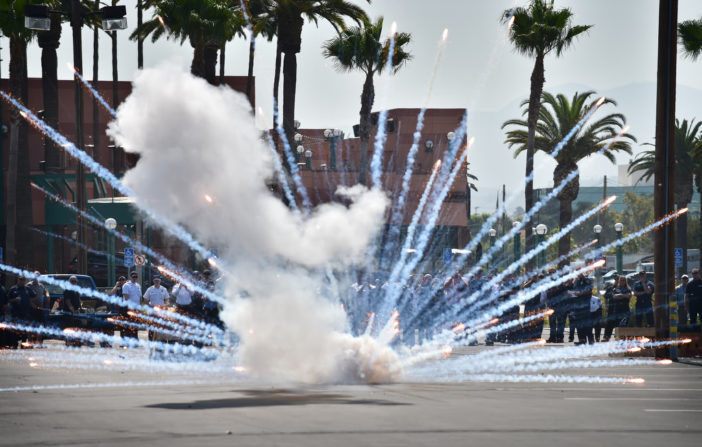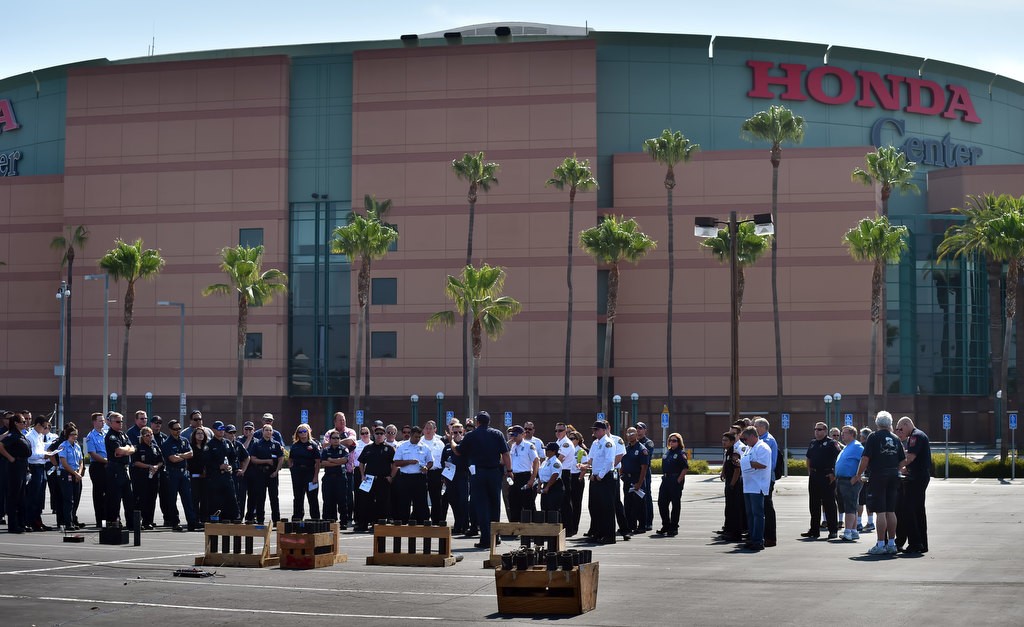On the eve of the signing of the Declaration of Independence, John Adams penned a letter to his wife, predicting that the anniversary of July 4, 1776 would “succeed by generations as the great anniversary festival” and should be celebrated with “bonfires and illuminations from one end of this continent to the other from this time forward forever more.”
Adams’ prediction couldn’t have been more accurate.
The nation’s second president and a signer of the Declaration of Independence likely would have been impressed by the elaborate annual fireworks pyrotechnic demonstrations staged Wednesday, June 22 at Honda Center in Anaheim for the first time.
Adams would have been equally pleased by the training that took place to insure that the only oohs and aahhs uttered among the crowds would be for the multicolored explosions high in the sky and not for the fireworks mistakenly shooting in some other direction.
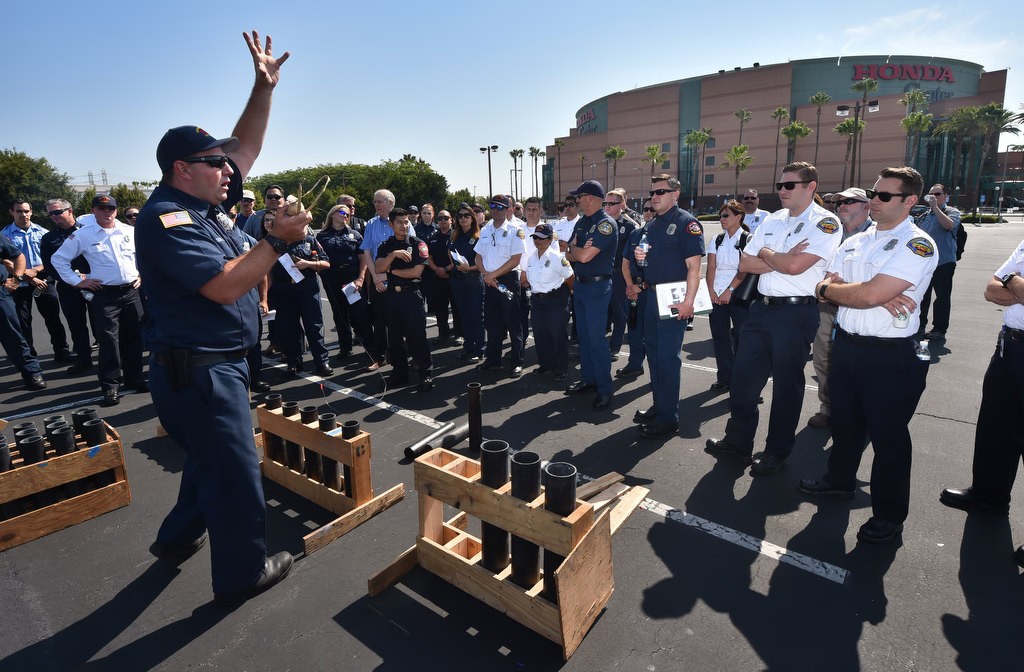
Orange County Fire Authority Engineer Scott Lake talks to firefighters from several agencies about different types of outdoor aerial fireworks, what can go wrong and what to look for as a fire inspector during a pyro training session at Honda Center on June 22.
Photo by Steven Georges/Behind the Badge OC
Hosted by Orange County Fire Prevention Officers section lead by President Alexandra Solano, Used Oil Program specialist for Anaheim Fire & Rescue, more than 120 fire personnel were on hand for the training, which provided attendees with all the information they need to insure that pyrotechnic shows come off without any unwanted surprises. The session was staged inside and outside the arena and featured live aerial fireworks and theatrical pyrotechnics.
In addition to Anaheim Fire & Rescue, agencies on hand included the City of Orange, OCFA, Brea, Newport Beach, Costa Mesa, Huntington Beach, Burbank and Rialto to name a few. Fire departments in Los Angeles and San Bernardino counties also attended the training.
“The most dangerous times in fireworks is when you are handling them,” said Scott Lake, an OCFA pyrotechnic expert who led the training.
“Not many fire departments have the opportunity to witness these types of displays more than once a year,” Solano said. “Here in Anaheim, we have several entertainment venues that have regular fireworks shows which makes it a perfect city to host the training.”
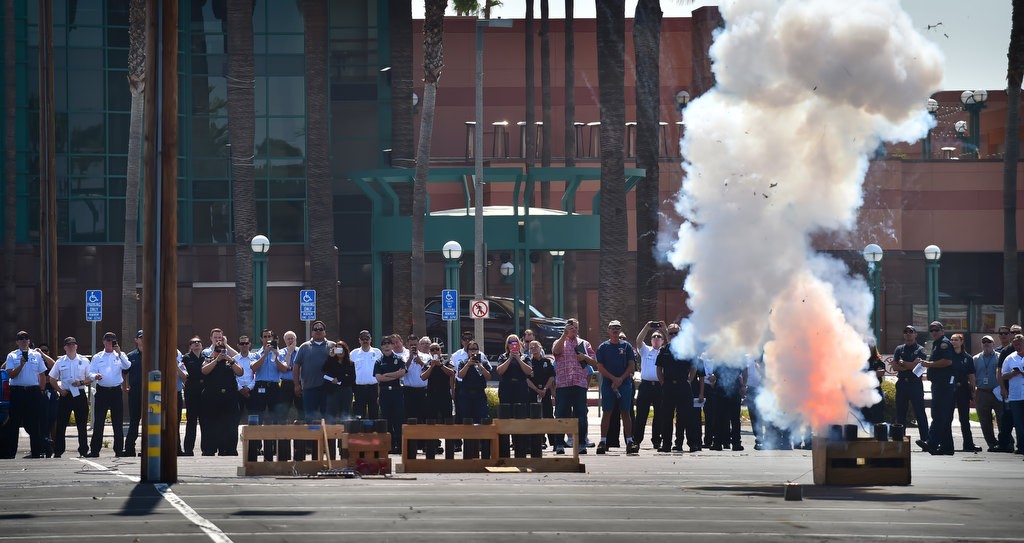
Various types of explosives are set off in the parking lot of Honda Center during a pyro and theatrical training session on June 22.
Photo by Steven Georges/Behind the Badge OC
Fire personnel on hand were tasked with discovering the purposely implanted safety hazards in the displays.
Fire personnel need to know the direction of the wind and what directions the fireworks will go, Lake said. They should arrive at the event early and investigate the setup long before the fireworks are loaded, he said.
The displays also must be secured properly and the firing mechanisms fully inspected.
Firefighters learned about verifying permits and plot plans, which include the layout of the display and its proximity to the audience or structures that could serve as fuel for a fire. Fire personnel must know how to deal with duds and misfires along with procedures that take place after a show.
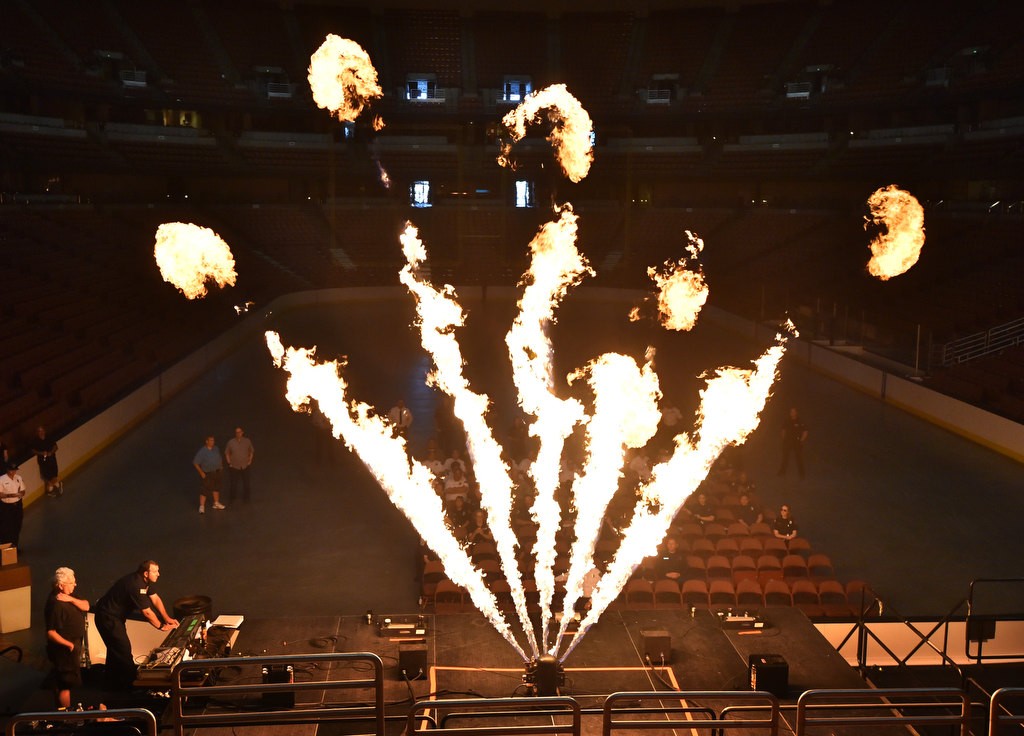
Various types of onstage fire generators are demonstrated inside Honda Center during the aerial/theatrical pyro training session.
Photo by Steven Georges/Behind the Badge OC
Many of these tasks apply to indoor pyrotechnic shows as well, such as the kind you might see at a concert or sporting event. Unsafe indoor pyrotechnic displays can be more dangerous than outdoor fireworks shows, Lake said.
“They can do more damage if something goes wrong because there are thousands of people for every event at this venue,” he said.
Jem FX of Los Angeles provided the fireworks and set up the displays.
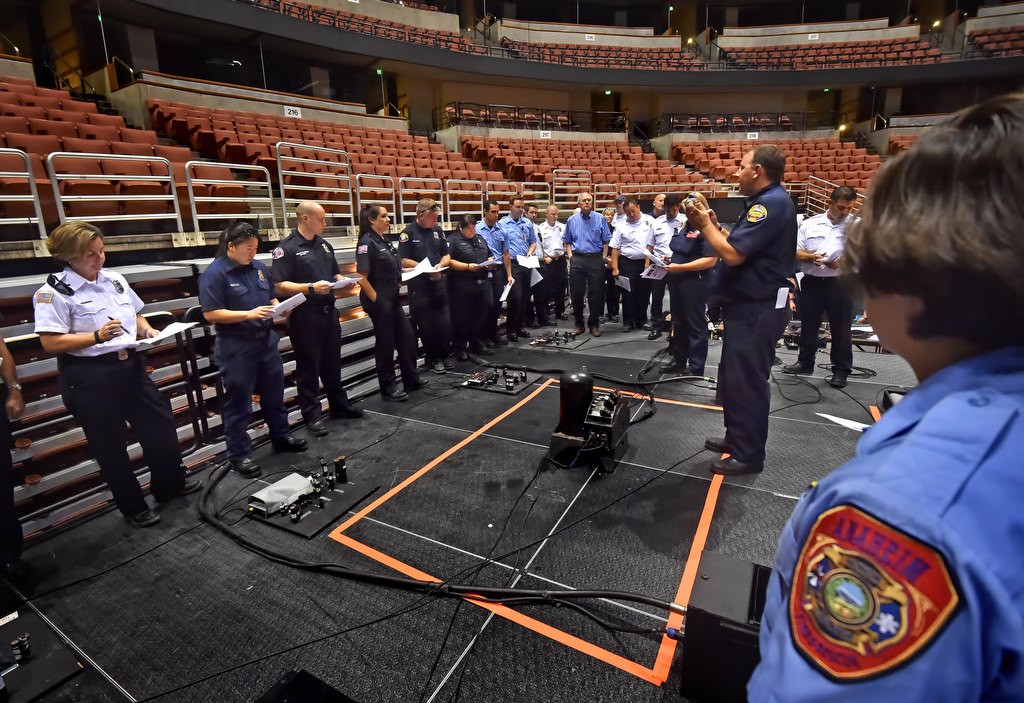
Orange County Fire Authority Engineer Scott Lake talks to fire personnel from various agencies about the various types of indoor theatrical fireworks and other types of fire generators used on stage and what to look out for during a fire inspection.
Photo by Steven Georges/Behind the Badge OC
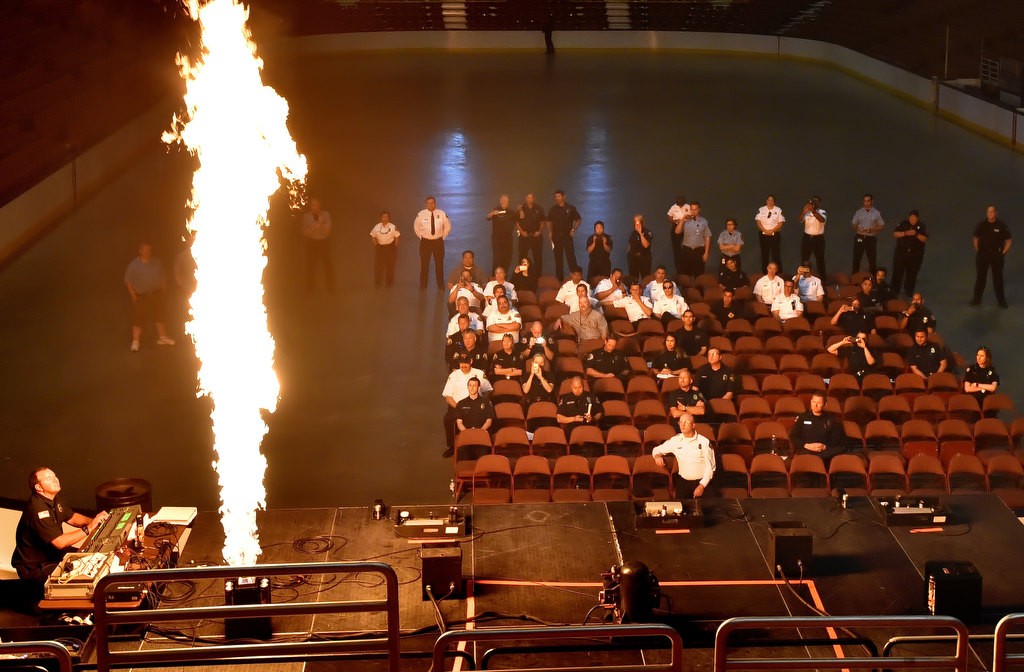
Firefighters from a variety of agencies watch as various types of onstage fire generators are demonstrated inside Honda Center.
Photo by Steven Georges/Behind the Badge OC
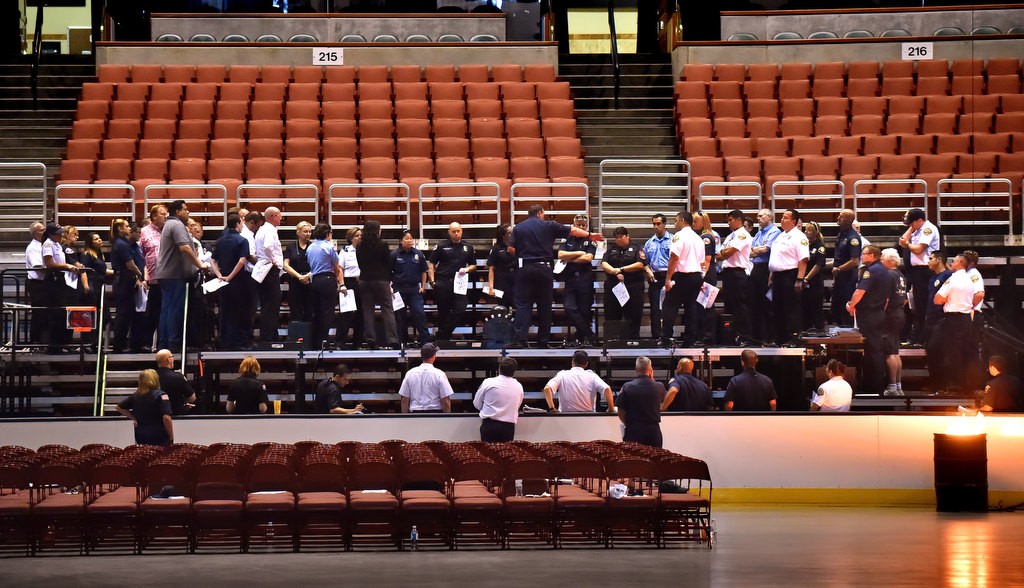
Orange County Fire Authority Engineer Scott Lake talks about the various types of indoor theatrical fireworks and other types of fire generators used onstage and what to look out for during a fire inspection.
Photo by Steven Georges/Behind the Badge OC
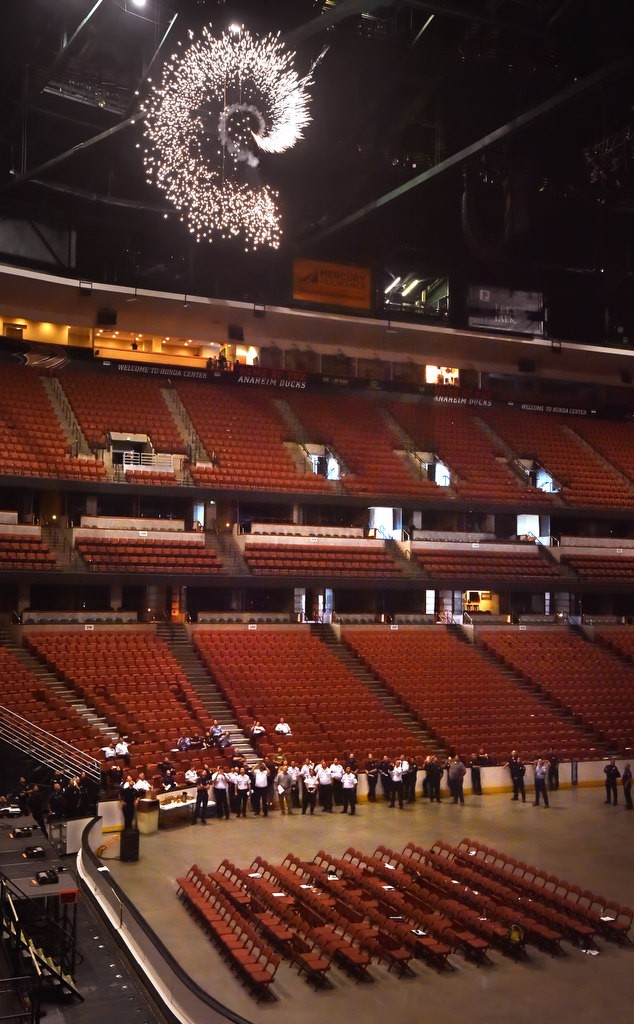
A variety of overhead indoor fireworks are set off inside Honda Center.
Photo by Steven Georges/Behind the Badge OC
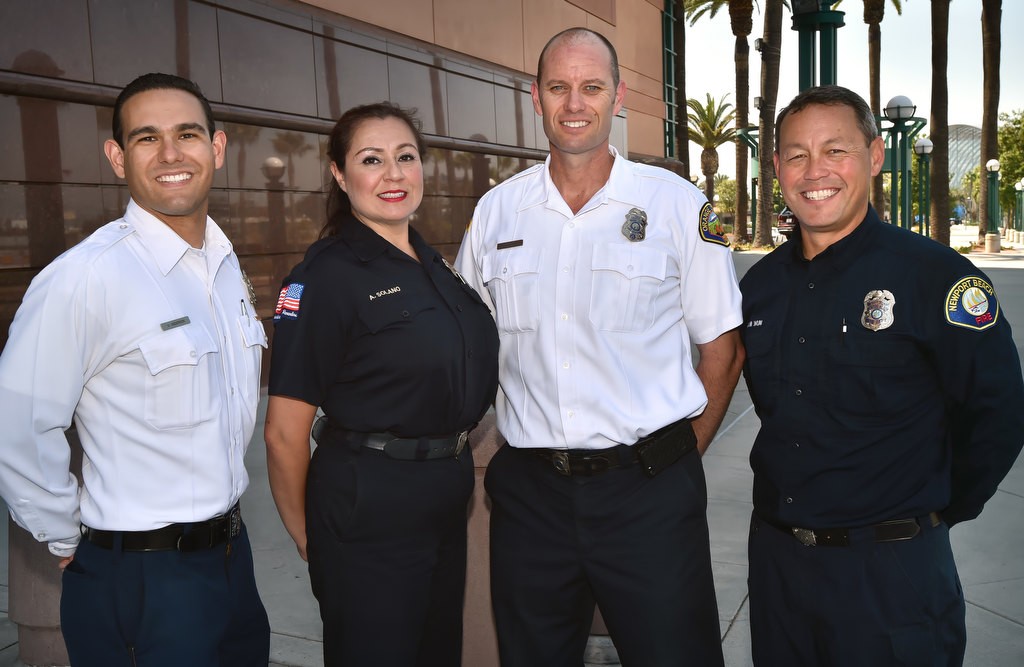
Orange County Fire Prevention Officers (OCFPO) Executive Board members include, from left, Vince Anderson, fire inspector for the City of Orange; Alexandra Solano, Anaheim Fire & Rescue & OCFPO president; Shawn Fraley, senior fire prevention specialist for Orange County Fire Authority and OCFPO secretary; and Raymi Wun, life safety specialist for Newport Beach Fire & OCFPO vice president.
Photo by Steven Georges/Behind the Badge OC
 Behind the Badge
Behind the Badge
